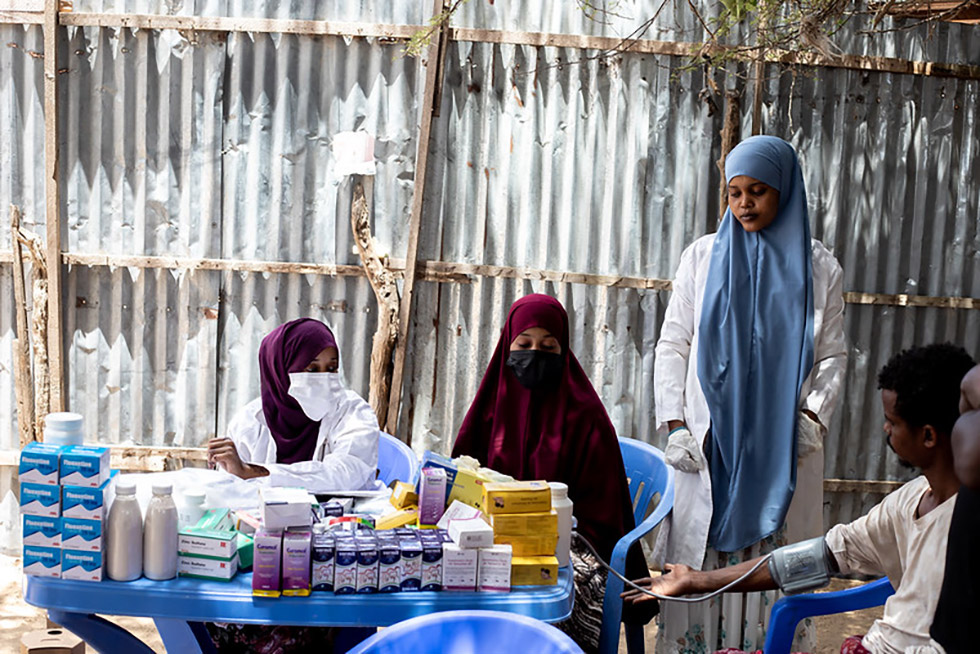 German funding has helped WHO Somalia support ministries of health to extend outreach sessions to more than 5 million people across 74 drought-affected areas in Somalia. Photo credit: WHO/I. Taxta4 December 2023, Mogadishu, Somalia – Over 7 million people in Somalia have gained access to improved health and nutrition services since November 2022, thanks to a collaborative effort between the World Health Organization (WHO) and the Government of Germany.
German funding has helped WHO Somalia support ministries of health to extend outreach sessions to more than 5 million people across 74 drought-affected areas in Somalia. Photo credit: WHO/I. Taxta4 December 2023, Mogadishu, Somalia – Over 7 million people in Somalia have gained access to improved health and nutrition services since November 2022, thanks to a collaborative effort between the World Health Organization (WHO) and the Government of Germany.
The German funding has enabled WHO to support the federal and state ministries of health to reach 65–70% of people living in the country’s 74 drought-affected districts, through 281 health facilities. This support has also helped WHO Somalia to strengthen community- and facility-based disease surveillance systems by deploying 2195 vaccinators and community health workers (CHWs).
“From identification of suspected cases, contact tracing, laboratory confirmation and treatment of patients throughout the global COVID-19 pandemic to managing the unprecedented drought and resultant cholera and measles outbreaks in the country, this German-supported introduction of community-based surveillance by WHO Somalia has helped save thousands of lives,” said Dr Fahim, Director of Immunization at the Federal Ministry of Health.
“The network of CHWs not only helped report disease outbreaks and instigate investigations but also collected data, which helped senior managers at the Ministry of Health and WHO to develop disease patterns and, ultimately, plan the targeted and timely integrated health and nutrition response to ongoing health emergencies across the country,” Dr Fahim added.
Using the German humanitarian assistance, WHO has achieved the following:
2195 vaccinators and community health workers deployed: These dedicated individuals have played a crucial role in disease surveillance, data collection, and outbreak response.
5,858,804 cases of communicable and noncommunicable diseases treated: Through integrated outreach sessions, health workers have provided essential care to millions of people.
1,495,284 people vaccinated against cholera: This targeted campaign has helped to prevent the spread of this deadly disease.
2,931,733 children vaccinated against measles: Protecting children from this highly contagious virus is a vital part of ensuring their health and well-being.
85 tons of medical supplies distributed: This critical support has helped health facilities in drought-affected districts to provide essential care to patients in need. Some 101 pediatric nutrition kits provided to treat severe acute malnutrition.
99% of the 33,567 children aged under 5 years identified with severe acute malnutrition were cured.
Dr. Sindani Ireneaus Sebit, WHO Representative a.i. to Somalia expressed gratitude for the German support: "This timely assistance has helped avert a major health crisis and saved countless lives. We are grateful to the Government of Germany for its unwavering commitment to the people of Somalia."
“The country’s fragile health system and the continued impact of climatic shocks continue to test the resolve and resilience of health partners and populations alike. The cost of our inaction will mean that children, women and other vulnerable people will pay with their lives while we hopelessly, helplessly witness the tragedy unfold,” added Dr Sindani. “As we have seen during our collective emergency response operations for COVID-19, early action and the delivery of high quality and evidence-based interventions can protect health and well-being, even if the health system is fragile.”
Background
Decades of conflict, frequent epidemics of cholera and measles, widespread poverty, and recurrent climatic shocks, including the ongoing drought emergency, continue to weaken Somalia’s health systems. The acute malnutrition burden in Somalia is expected to reach about 1.5 million children in 2024, including 331 000 children likely to suffer severe acute malnutrition.
Increased incidences of waterborne diseases, especially cholera and acute diarrhoea, are seen among drought-affected populations. The country is experiencing multiple disease outbreaks, including measles, cholera and dengue fever, and heavy seasonal rains made worse by El Niño, resulting in increased morbidity and mortality.
From January to November 2023, 16 036 cholera cases, including 43 deaths, were reported. While the epidemiological trends have been stabilizing, about 400–600 cholera cases on average continue to be reported each week. This situation is expected to worsen due to floods and other impacts of El Niño.
For more information, please contact:
Fouzia Bano, Communications Officer, WHO Somalia
Email:
This e-mail address is being protected from spambots. You need JavaScript enabled to view it
Saeed Ahmed, Reporting Officer, WHO Somalia
Email:
This e-mail address is being protected from spambots. You need JavaScript enabled to view it
Related links
Cholera cases on the rise in Somalia amid rising displacement of people




